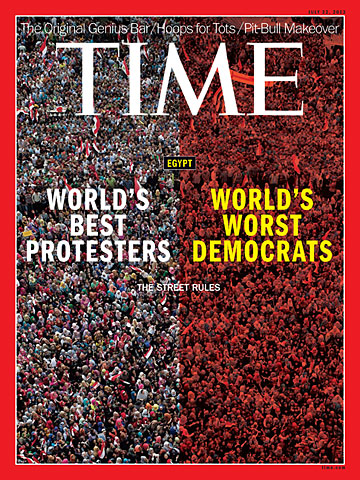
Crowds are everything in egyptian politics. The throngs in tahrir square ousted President Hosni Mubarak after three decades in power, and public protests shortened the rule of the geriatric generals who first took his place. That ushered in Egypt's first fair presidential election in, well, 6,000 years of history. But then, after only one year of democratic leadership, the crowds took over again. For many Egyptians, protest equals democracy. The millions afoot on June 30 persuaded Egypt's powerful military to remove President Mohamed Morsi after his first and only year in office. One of the first acts of its "transitional government" was to order a TV blackout of the massive rally that Morsi's supporters in the Muslim Brotherhood called in response. Not very democratic of them. The Brotherhood's supreme guide, Mohammed Badie, then commanded followers to defend "every square in Egypt," an order that transformed a political competition into a contest for territory, the stuff of war. And that may be where Egypt is headed if it doesn't figure out how to move its politics out of the hot sun.
Thirty loud, footsore months after dispatching a despot by demonstrations, Egyptians remain the world's premier protesters. But they're proving to be lousy democrats. Morsi ruled as if he were answerable only to his Brotherhood, and to hell with the 48% of the electorate who did not vote for him. By embracing the military to finish off Morsi, his political opponents abandoned the democratic process for which many of them had risked their lives two and a half years ago. Popular as it was, the coup sets a precedent for transferring power not by the ballot box but by the mob. And it broadcast a clear signal to Islamists everywhere that elections are exactly what the extreme among them have always warned: pointless.
"I don't think there was an alternative, to tell you the truth," says Hussein Gohar, a senior official in the liberal Social Democrat party and one of the coup's more reluctant supporters. Like many in the anti-Morsi alliance, he says the President was systematically undermining democracy by writing an Islamist constitution and stacking the deck for future elections. "I don't think if we waited another four years we could have done anything about it," Gohar adds.
But in trying to save democracy, Morsi's opponents may have jeopardized it. Gohar acknowledges that the furies first unleashed in Tahrir Square could haunt any future government. "The precedent is street politics now," he says. "It's not the best thing." On this point, at least, some Brotherhood leaders agree. "It doesn't help anyone to just count and compare crowds," says Amr Darrag, a member of Morsi's Cabinet. "This is going to be endless."
Remember the Arab Street? The phrase has done long and reliable service as journalistic shorthand for an excitable public both feared and manipulated by cynical autocrats. But in Egypt, the street is now the ballot box, the crucible of power. The country's notional new rulers--an unlikely alliance of generals, judges, liberal pols and Islamic extremists--have tried to shift the debate indoors, publishing a schedule for elections and an amended constitution. But events are likely to be driven more by protesters than proconsuls. While Egyptians debated whether Morsi was removed by coup or popular uprising, the Twitterati coined a new appellation: Streetocracy.
